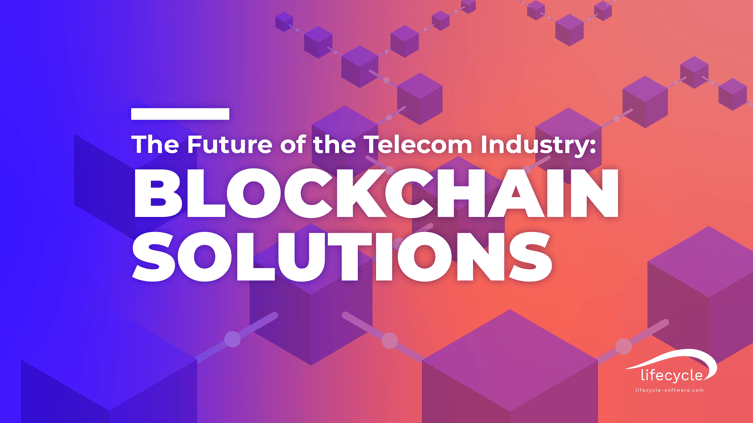
Blockchain, known for other terms like cryptocurrency, is a topic that is getting traction nowadays. In this blog, we will explain what Blockchain is, its benefits and its use cases inside the telecommunication sector.
First things first, let’s uncover: What is a Blockchain?
Every time that we think about blockchain, we instantly think of bitcoin. Well, they are closely related, and to be honest, bitcoins were transferred through blockchains before other use cases were developed. A blockchain is a database and a distributed digital ledger. Through the past years, we have witnessed a sharp growth of this technology and how it disrupts the way transactions are processed and how users are quickly authenticated.
The first industry to start using this technology was Fintech, but almost every industry is available to receive this type of technology, including the telecom industry. Indeed, telecommunications are a key industry to this type of technology and could increase their revenue by benefiting from this strategy.
To start simplifying the question, a blockchain solution can enable telecom service providers to store unique device/SIM data on the blockchain alongside customer profiles. Other possible uses cases are to block a stolen device and keep third parties informed of any change in device status. So, all transaction details between parties are kept in the ledger. The entire system becomes highly secure and free of any limiting intermediary that we all rely on in any similar transaction-based network available. If a customer requests a transaction, that transaction will be transmitted in the Blockchain network using its own unique #. One of the nodes will recognize the #, verify it, and allow the transaction to proceed.
The node does not know who the end customer or vendor is at any point in time. As a result, Blockchain is an unalterable digital diary comprised of transactions (can be data, currency, or anything of economic value). Each transaction is distinct and is stored in a distributed system that cannot be lost.
This sounds scary, but it’s our future, and we need to take the best advantage of it. So, in this way, how can we use blockchain in the telecom industry? The use cases are numerous but here are some of the top blockchain example use cases:
1. Mobile payments and billing: Blockchain technology has the potential to enable secure and efficient mobile payment and billing systems. Customers can use blockchain to make direct payments to telecom providers using cryptocurrency or digital tokens, decreasing the need for intermediaries, and lowering transaction fees.
2. Identity management: Blockchain technology can be used to build a safe, decentralized identity management system for telecom customers. This can help prevent identity theft and fraud, as well as managing personal information easier for customers.
3. Supply chain management: To deliver their services, telecom providers rely on a complex network of suppliers and vendors. Blockchain technology can be used to build a secure and transparent supply chain management system that allows providers to track the flow of goods and services from suppliers to end users.
4. Blockchain can be used to improve network security by establishing a secure, decentralized network that is resistant to hacking and other security threats.
5. IoT connectivity: Blockchain can enable secure and efficient connectivity for IoT devices, which are becoming increasingly popular in the telecommunications industry. IoT devices can communicate directly with one another using blockchain, decreasing the need for intermediaries and reducing latency.
6. Roaming agreements: Blockchain has the potential to make telecom provider roaming agreements more efficient and transparent. Providers can use blockchain to create smart contracts that execute automatically when customers leave their home network, reducing the complexity and cost of roaming agreements.
At this point, you are thinking: how can my company benefit from this? Well, let us introduce you to some blockchain benefits:
- Enhanced security: Due to its decentralized and distributed nature, blockchain is known for its high level of security. This can help prevent data breaches, fraud, and other security threats in the telecom industry.
- Transparency: The use of blockchain technology can assist telecom companies in increasing transparency in their operations. This can include giving customers more visibility into their data usage and billing, as well as making network performance tracking and management easier.
- Increased efficiency: Blockchain technology has the potential to automate many processes in the telecom industry, reducing the need for manual intervention and streamlining operations. This can save businesses time and money while also improving the overall customer experience.
- Transactions that are faster and more secure: Blockchain technology can enable faster and more secure transactions, which can help improve the speed and efficiency of telecom services.
- Identity management has been improved: Blockchain can be used to create a secure, decentralized identity management system for telecom customers. This can help prevent identity theft and fraud, as well as make managing personal information easier for customers.
- Blockchain can be used to collect and store large amounts of data, which can then be analyzed to gain valuable into customer behavior and network performance.
Overall, the use of blockchain technology in the telecom industry has the potential to transform the way telecom companies operate and provide services to their customers, while also improving security and efficiency. Lifecycle Software is at the forefront when it comes to innovation in telecoms. If you are interested in discussing blockchain use cases with us, we’re happy to chat!
Book a meeting with our tech team


